The NBA’s rookie scale, which determines how much first-round picks earn during their first four NBA seasons, also dictates how much the qualifying offers will be worth for those players when they reach restricted free agency after year four. However, the value of those qualifying offers can fluctuate depending on whether or not a player has met the “starter criteria.”
Here’s how the starter criteria works in a typical year:
- A player who is eligible for restricted free agency is considered to have met the starter criteria if he plays at least 2,000 minutes or starts 41 games in the season before he reaches free agency.
- A player can also meet the criteria if he averages either of those marks in the two seasons prior to his restricted free agency. For instance, if a player started 50 games one year and 32 the next, he’d meet the starter criteria, since his average number of starts over the last two seasons is 41.
The thresholds for the starter criteria this year are a little different due to the truncated nature of the last two NBA seasons. The 41-start and 2,000-minute thresholds are prorated and are based on the pre-bubble games in 2019/20 and a 72-game schedule in 2020/21.
In other words, if a player’s team played 64 games prior to the summer restart last season, he’d need to compile 68 starts across the two seasons (half of 136 games) to meet the criteria. This proration applies to a player’s minutes total as well.
A player’s ability or inability to meet the starter criteria can affect the value of the qualifying offer he receives as a restricted free agent, as follows:
- A top-14 pick who does not meet the starter criteria will receive a qualifying offer equal to the amount the 15th overall pick would receive if he signed for 120% of the rookie scale.
- A player picked between 10th and 30th who meets the criteria will receive a qualifying offer equal to the amount the ninth overall pick would receive if he signed for 120% of the rookie scale.
- A second-round pick or undrafted player who meets the criteria will receive a qualifying offer equal to the amount the 21st overall pick would receive if he signed for 100% of the rookie scale.
- For all other RFAs, the standard criteria determine the amounts of their qualifying offers.
Extending a qualifying offer to a player eligible for restricted free agency officially makes that player an RFA, ensuring that his team has the right of first refusal if he signs an offer sheet with another club. It also gives the player the option of signing that one-year QO.
Generally, the value of a restricted free agent’s qualifying offer isn’t hugely important, since very few RFAs accept those offers outright. There are exceptions though.
Last offseason, for instance, Denzel Valentine failed to meet the starter criteria heading into restricted free agency, reducing the value of his qualifying offer to $4,642,800. The Bulls decided to issue that qualifying offer and he accepted it.
Had he met the starter criteria and been eligible for a slightly larger QO, Valentine’s free agency could have played out differently, as Kris Dunn‘s did — Dunn met the starter criteria, increasing the value of his QO, and Chicago opted not to give him a QO, making him an unrestricted free agent.
Top-14 picks who failed to meet starter criteria:
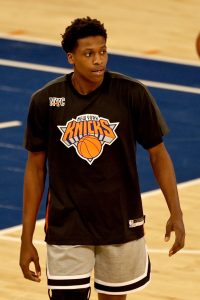 With all that in mind, let’s check in on how this year’s RFAs-to-be will be impacted by the starter criteria. Listed below are the former top-14 picks on track for restricted free agency who have not met the starter criteria. These players will be eligible for qualifying offers worth $7,031,451.
With all that in mind, let’s check in on how this year’s RFAs-to-be will be impacted by the starter criteria. Listed below are the former top-14 picks on track for restricted free agency who have not met the starter criteria. These players will be eligible for qualifying offers worth $7,031,451.
Half of the players selected in the top 14 of the 2017 draft signed rookie scale extensions in 2020, meaning they won’t have to worry about the value of their qualifying offers this offseason. Of the other seven, the four players listed above failed to meet the criteria.
Even with the lower qualifying offers, some of these players – including Ntilikina and Smith – may not receive QOs at all, making them unrestricted free agents.
Lonzo Ball (Pelicans) and Lauri Markkanen (Bulls) each met the starter criteria, securing potential QOs of $14.36MM and $9.03MM, respectively. Josh Jackson was the only top-14 pick from ’17 who was waived before completing his rookie contract — since he’s on a new contract now, the starter criteria doesn’t apply to him.
First-round picks between 10-30 who met starter criteria:
A pair of players fall into this group this season, and will now be eligible for a qualifying offer worth $7,705,447.
As a result of meeting the starter criteria, Collins’ qualifying offer will increase from $5,899,793, while Allen’s get a bump from $5,661,538. It’s unlikely to matter a whole lot for either player though, since they’re both strong candidates to sign lucrative long-term deals and almost certainly won’t give any real consideration to accepting their respective QOs.
Pelicans wing Josh Hart, the 30th overall pick in 2017, was the strongest candidate to join Collins and Allen in this group, but will fall short of meeting the criteria due in large part to the thumb injury that has sidelined him since April 1. If Hart had played the Pelicans’ last 19 games and maintained his minutes per game average for the season (28.7 MPG), he would’ve passed the required minutes threshold by now.
Second-round picks and UDFAs who met starter criteria:
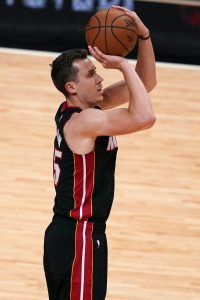 The players listed below signed as second-round picks or undrafted free agents, but have met the starter criteria and are now eligible for a qualifying offer worth $4,736,102.
The players listed below signed as second-round picks or undrafted free agents, but have met the starter criteria and are now eligible for a qualifying offer worth $4,736,102.
Brown, Graham, Nunn, Robinson, and Trent are all on minimum-salary contracts and would’ve had very modest QOs (in the $2MM range) if they hadn’t met the starter criteria. Even after the bump to $4.74MM though, most or all of them will end up signing more lucrative contracts.
Among other second-round picks and undrafted free agents, two who came close to meeting the starter criteria are Isaac Bonga (Wizards) and Jarred Vanderbilt (Timberwolves).
After starting 41 games of 64 pre-bubble games a year ago, Bonga needed to make 27 starts this season, but has only started eight games for Washington to date. As for Vanderbilt, he needed 36 starts in 2020/21 to bump the value of his QO — he recorded his 25th start on March 26, but hasn’t been in Minnesota’s starting five since then.
Bonga, Vanderbilt, and the rest of this year’s restricted free agents, won’t have their projected qualifying offers impacted by the starter criteria.
Photos courtesy of USA Today Sports Images.
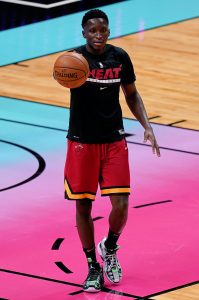 It’s a disappointing turn of events for Oladipo and for the Heat, who acquired the two-time All-Star at the trade deadline in March. However, if there’s a belief that going under the knife again represents Oladipo’s best path back to full strength, it’s the right call.
It’s a disappointing turn of events for Oladipo and for the Heat, who acquired the two-time All-Star at the trade deadline in March. However, if there’s a belief that going under the knife again represents Oladipo’s best path back to full strength, it’s the right call.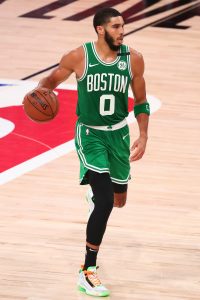 Fox probably has no chance at making an All-NBA team, given the competition at guard and the Kings’ spot in the standings. The other three players here have better cases, but Adebayo is likely a long shot, making Mitchell and Tatum the most realistic candidates. They’d only need to sneak onto the Third Team to increase the projected value of their new five-year deals by more than $32MM.
Fox probably has no chance at making an All-NBA team, given the competition at guard and the Kings’ spot in the standings. The other three players here have better cases, but Adebayo is likely a long shot, making Mitchell and Tatum the most realistic candidates. They’d only need to sneak onto the Third Team to increase the projected value of their new five-year deals by more than $32MM.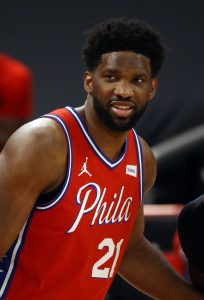 Embiid is still under contract for two more years beyond 2020/21, which is why he’d only be able to tack on four new years to his current deal instead of five. Jokic is in a similar spot, but because he’ll only have six years of NBA service at the end of this season, he’d have to wait until 2022 to officially sign an extension, at which point he’d be eligible for five new years instead of just four.
Embiid is still under contract for two more years beyond 2020/21, which is why he’d only be able to tack on four new years to his current deal instead of five. Jokic is in a similar spot, but because he’ll only have six years of NBA service at the end of this season, he’d have to wait until 2022 to officially sign an extension, at which point he’d be eligible for five new years instead of just four.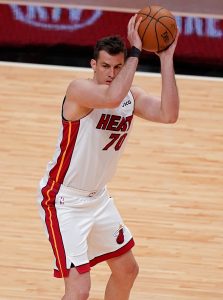 Nemanja Bjelica
Nemanja Bjelica With all that in mind, let’s check in on how this year’s RFAs-to-be will be impacted by the starter criteria. Listed below are the former top-14 picks on track for restricted free agency who have not met the starter criteria. These players will be eligible for qualifying offers worth $7,031,451.
With all that in mind, let’s check in on how this year’s RFAs-to-be will be impacted by the starter criteria. Listed below are the former top-14 picks on track for restricted free agency who have not met the starter criteria. These players will be eligible for qualifying offers worth $7,031,451. The players listed below signed as second-round picks or undrafted free agents, but have met the starter criteria and are now eligible for a qualifying offer worth $4,736,102.
The players listed below signed as second-round picks or undrafted free agents, but have met the starter criteria and are now eligible for a qualifying offer worth $4,736,102.